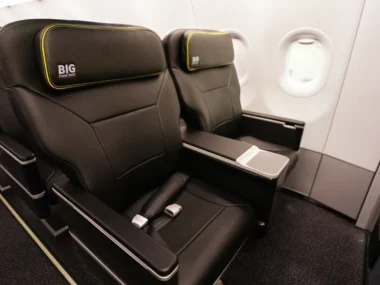“Trump is a crazy man,” says Lionel Xu, surrounded by stacks of mosquito repellent kits once popular in U.S. Walmart stores.
Now, those kits remain boxed in a Chinese warehouse, stuck there unless President Donald Trump removes the 145% tariff imposed on Chinese exports to the U.S.
“This is really hard on us,” Xu says.
About half of Sorbo Technology’s products—Xu’s company—are typically sold to the U.S. The business, with 400 employees in Zhejiang province, may be small by China’s standards but is deeply affected by the ongoing trade tensions.
“We’re really concerned. If Trump doesn’t reverse this, our factory could be in real danger,” he adds.
Nearby, Amy, who works for Guangdong Sailing Trade Company, is trying to sell ice cream makers. Her major clients, including Walmart, are also based in the U.S.
“We’ve already shut down production,” she says. “All our goods are sitting in storage.”
That same frustration echoed throughout the Canton Fair in Guangzhou, a major trade exhibition.
As Xu prepares to meet some Australian buyers for lunch—hoping they’ll strike a deal—he remains cautiously optimistic.
“We’ll see what happens with the tariffs,” he says. “Maybe things will improve in a month or two,” he adds, crossing his fingers. “Maybe, maybe…”

The US and China have imposed steep tariffs on one another’s goods.
Last week, President Trump temporarily eased most tariffs following a sharp decline in global stock markets and a significant sell-off in the U.S. bond market.
However, he left tariffs on Chinese exports to the U.S. unchanged. In retaliation, Beijing imposed 125% duties on American imports.
This tit-for-tat has confused traders from over 30,000 businesses attending the annual Canton Fair, where thousands of goods are showcased across exhibition halls spanning the size of 200 football fields.
In the homeware section, manufacturers displayed products like washing machines, electric toothbrushes, juicers, and waffle makers. Buyers from around the globe visit to evaluate and strike deals—but now, with the additional tariffs, the price of items like food mixers and vacuum cleaners has risen beyond what many American retailers can absorb or pass on to consumers.
As the U.S. and China remain locked in a stalemate, Chinese-made products destined for U.S. homes are accumulating in warehouses.
American consumers may soon feel the impact at home, as everyday appliances become more expensive due to the trade conflict.
China has taken a firm stance, pledging to continue the trade fight “until the end.”
That determination is echoed at the fair. Hy Vian, a buyer interested in electric ovens, dismissed the tariffs’ impact.
“If they don’t want us exporting, let them wait,” he said. “We already have a strong market in China—we’ll give our best products to domestic buyers first.”

Lionel Xu says he’s concerned about the consequences if Trump refuses to remove the tariffs on Chinese goods.
China’s Domestic Market Struggles to Offset Export Decline Amid Tariffs
With a population of 1.4 billion, China theoretically has a vast domestic market. Policymakers have been pushing to boost consumer spending to stimulate growth in a sluggish economy.
However, the strategy isn’t gaining traction. Many middle-class households, having invested heavily in property, have seen home values drop over the past four years. As a result, people are focusing on saving rather than spending.
Despite its internal market potential, China remains heavily dependent on exports. Last year, exports contributed roughly half of the country’s economic growth.
China still holds its title as the world’s manufacturing hub. Goldman Sachs estimates that 10 to 20 million Chinese workers are tied directly to goods destined for the U.S.
Many of these workers are already facing the impact.
Just outside the Canton Fair, countless small workshops in Guangdong are busy producing clothing, footwear, and accessories. The area supplies major e-commerce giants like Shein and Temu. Inside these buildings, multiple factories operate on different floors, where workers routinely put in 14-hour shifts.

The BBC visited a workshop in a village near Guangzhou that has shifted its focus from exports to serving the domestic market.
On a pavement near shoe factories, a few workers were seen sitting, chatting, and smoking.
“Things aren’t going well,” one worker said, requesting anonymity. His friend urged him to stop talking, as discussing economic struggles can be sensitive in China.
“We’ve had difficulties since the COVID pandemic, and now with this trade war. I used to earn 300-400 yuan ($40-54) a day, but now I’m lucky to make 100 yuan a day.”
The worker explained that finding work has become harder. Other shoe makers on the street mentioned they were only earning enough to cover basic living expenses.
While some in China take pride in their products, others are feeling the pain of rising tariffs and are uncertain about how this crisis will resolve.
China faces the risk of losing a key trading partner, which purchases over $400 billion (£302 billion) in goods annually. However, the impact will be felt on both sides, with economists warning that the U.S. could be heading toward a recession.

Businesses at the Canton Fair in Guangzhou have stated that they have halted shipments of goods to the U.S. due to the ongoing trade tensions.
Adding to the uncertainty is President Trump, known for his confrontational approach, who continues to press Beijing, while China refuses to back down.
However, Beijing has stated it will not increase the current 125% tariff on U.S. goods, leaving room for possible retaliation through other means. This provides both sides some relief after a week that escalated tensions into an economic conflict.
Reports suggest there is minimal communication between Washington and Beijing, and neither side seems ready to resume negotiations anytime soon.
In the meantime, some businesses at the Canton Fair are exploring new markets. Amy, for example, hopes to redirect her ice cream makers to new regions.
“We’re looking to enter the European market, maybe Saudi Arabia, and of course Russia,” she says.
Others, like Mei Kunyan, 40, believe opportunities still exist in China. Mei earns around 10,000 yuan a month from his shoe business, selling to local customers, while many major shoe manufacturers have relocated to Vietnam for cheaper labor.
Mei has come to a realization shared by many of those around him: “The Americans are too tricky.”











